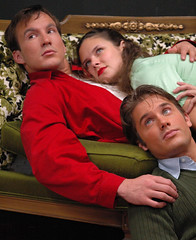Half a century has passed since Rebel Without a Cause, the ur-film of postwar teenage alienation, made matinee idols of James Dean, Natalie Wood and Sal Mineo. The Barely Balancing Artists Group, a theatrical company formed especially for the Hollywood classic’s golden anniversary, is marking the occasion with a stage adaptation in New York. But the story of Rebel raises a few problems for a new staging. This production solves some of them well, others not so well.
The first two-thirds or so of the movie presents just the kind of wordy, psychological drama that translates well to the distillations and economies of the stage. James Fuller’s adaptation follows the screenplay fairly closely, adding a bit of explication, making some elisions and cuts, and keeping up a quick pace.
One cut, however, has a major negative consequence. Eliminating the character of Judy’s father and the scenes of her home life takes away much of the dramatic foundation of her character. Judy’s breakthrough moments – her declaration that she’s never going back home, and the moment with Jim when she realizes “I love somebody” – ring hollow without an understanding of why she feels so rejected. It’s a testament to the actress Erin Cunningham’s subtlety and heart that her Judy comes across as sympathetic and compelling.
By contrast, the playwright has taken care to preserve the drama of Jim’s home life. Unfortunately the actors playing Jim’s parents either chose or were directed to portray them as caricatures of a weak father and domineering mother rather than complex characters with their own demons. There’s none of the tragic gravity Jim Backus brought to the father’s role in the film, and the mother’s creepy iciness here turns to Jewish-mother guilt that sometimes seems, perhaps unintentionally, to be played for laughs.
Which brings us to the lead role of their son, Jim Stark. Measuring up to, or even just engaging with, James Dean’s seminal performance would be a challenge for any actor on stage or screen. But during the first act Joshua Coleman (who also co-directed) succeeds in conveying Jim’s two sides: the cool-kid confidence that lets him approach Judy fearlessly and win the respect of the gangleader Buzz (played with aplomb by Major Dodge), and the raw desperation of his need for structure in the face of his father’s weakness. The latter is impressive since the parents give him little to play off of in their scenes together.
Allie Mulholland is also good as the worhipful, parentless Plato, although, even when wielding a gun, he doesn’t quite convey the lurking danger that led one to believe Sal Mineo’s character capable of shooting puppies. (Also, oddly, most of the homoerotic tension has been excised.)
Stagewise, the play’s two major weaknesses become prominent in the second act. The first problem is that the movie’s atmosphere of almost surreal strangeness, along with its wonderful depiction of the well-to-do suburban lifestyle that fills kids with such potentially destructive ennui, is entirely absent. Any kid who grew up bored in the suburbs, even today, can empathize with the characters in the movie as they make up dangerous games, poke around in abandoned houses, crack wise on a class trip to the planetarium, and get in trouble with the police. But, aside from the evidence of Mr. Stark’s spiffy suit, the kids in this play could be poor or rich, urban or suburban. The story’s deep themes may be universal, but its pop psychology is very much of its time and milieu. Lighting, sound and direction are not used to convey this.
The second problem is partially attributable to the asymmetrical structure of the original film. Once Jim, Judy and Plato form their little pseudo-family in the abandoned mansion, the movie’s pace slows considerably, with much moving about through several large and complex outdoor and indoor settings. It becomes, essentially, an action-suspense film. This production’s solution to translating that very long sequence to the stage is to compress it considerably, but at the cost of giving Jim’s character the space and time to grow as he does in the film. Trying to coax the gun away from Plato, Jim comes across as a composed hero, not someone nervously finding his manliness. Also, the ending is mishandled in that the staging doesn’t make clear why the final tragic shot is fired.
In spite of those flaws, the production partially succeeds as homage and adaptation, mostly on the strength of the good performances noted above. The supporting players who portray the gang kids are amusing and spirited as well. I suspect that sticking closer to the form and tone of the original – in spite of its thoroughly cinematic nature – might have raised the stage play to a higher level.
REBEL WITHOUT A CAUSE
THE LION THEATRE in the Theatre Row Complex
410 West 42nd St. (between 9th and 10th Avenues), New York City
October 6-30, 2005 (Thursdays-Saturdays @ 8pm, Sundays @ 2pm, Mondays @ 8pm
Tickets: Call (212) 279-4200 or visit
 Blogcritics The critical lens on today's culture & entertainment
Blogcritics The critical lens on today's culture & entertainment




